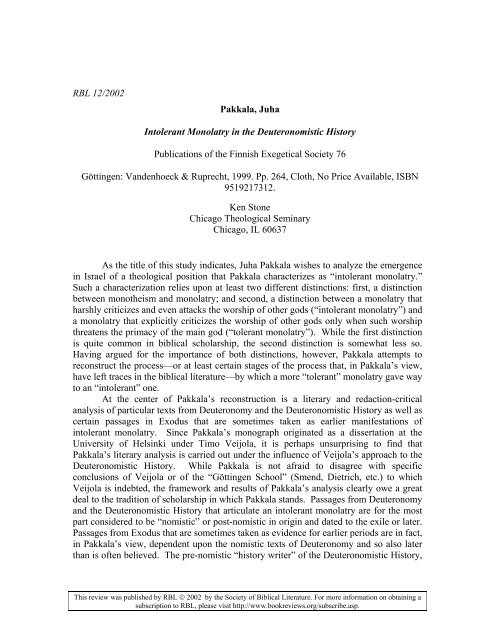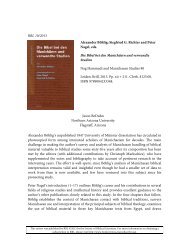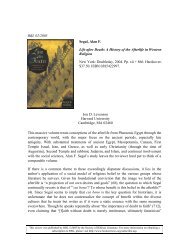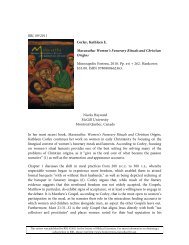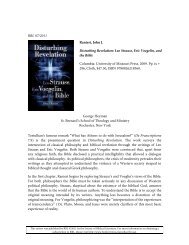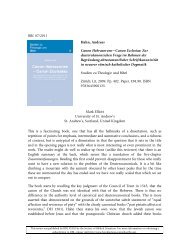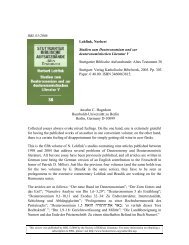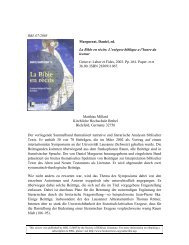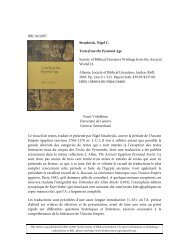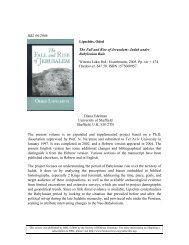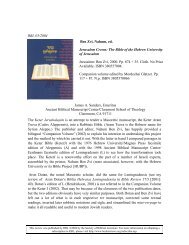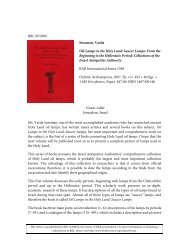Intolerant Monolatry in the Deuteronomistic History - Review of ...
Intolerant Monolatry in the Deuteronomistic History - Review of ...
Intolerant Monolatry in the Deuteronomistic History - Review of ...
You also want an ePaper? Increase the reach of your titles
YUMPU automatically turns print PDFs into web optimized ePapers that Google loves.
RBL 12/2002<br />
Pakkala, Juha<br />
<strong>Intolerant</strong> <strong>Monolatry</strong> <strong>in</strong> <strong>the</strong> <strong>Deuteronomistic</strong> <strong>History</strong><br />
Publications <strong>of</strong> <strong>the</strong> F<strong>in</strong>nish Exegetical Society 76<br />
Gött<strong>in</strong>gen: Vandenhoeck & Ruprecht, 1999. Pp. 264, Cloth, No Price Available, ISBN<br />
9519217312.<br />
Ken Stone<br />
Chicago Theological Sem<strong>in</strong>ary<br />
Chicago, IL 60637<br />
As <strong>the</strong> title <strong>of</strong> this study <strong>in</strong>dicates, Juha Pakkala wishes to analyze <strong>the</strong> emergence<br />
<strong>in</strong> Israel <strong>of</strong> a <strong>the</strong>ological position that Pakkala characterizes as “<strong>in</strong>tolerant monolatry.”<br />
Such a characterization relies upon at least two different dist<strong>in</strong>ctions: first, a dist<strong>in</strong>ction<br />
between mono<strong>the</strong>ism and monolatry; and second, a dist<strong>in</strong>ction between a monolatry that<br />
harshly criticizes and even attacks <strong>the</strong> worship <strong>of</strong> o<strong>the</strong>r gods (“<strong>in</strong>tolerant monolatry”) and<br />
a monolatry that explicitly criticizes <strong>the</strong> worship <strong>of</strong> o<strong>the</strong>r gods only when such worship<br />
threatens <strong>the</strong> primacy <strong>of</strong> <strong>the</strong> ma<strong>in</strong> god (“tolerant monolatry”). While <strong>the</strong> first dist<strong>in</strong>ction<br />
is quite common <strong>in</strong> biblical scholarship, <strong>the</strong> second dist<strong>in</strong>ction is somewhat less so.<br />
Hav<strong>in</strong>g argued for <strong>the</strong> importance <strong>of</strong> both dist<strong>in</strong>ctions, however, Pakkala attempts to<br />
reconstruct <strong>the</strong> process—or at least certa<strong>in</strong> stages <strong>of</strong> <strong>the</strong> process that, <strong>in</strong> Pakkala’s view,<br />
have left traces <strong>in</strong> <strong>the</strong> biblical literature—by which a more “tolerant” monolatry gave way<br />
to an “<strong>in</strong>tolerant” one.<br />
At <strong>the</strong> center <strong>of</strong> Pakkala’s reconstruction is a literary and redaction-critical<br />
analysis <strong>of</strong> particular texts from Deuteronomy and <strong>the</strong> <strong>Deuteronomistic</strong> <strong>History</strong> as well as<br />
certa<strong>in</strong> passages <strong>in</strong> Exodus that are sometimes taken as earlier manifestations <strong>of</strong><br />
<strong>in</strong>tolerant monolatry. S<strong>in</strong>ce Pakkala’s monograph orig<strong>in</strong>ated as a dissertation at <strong>the</strong><br />
University <strong>of</strong> Hels<strong>in</strong>ki under Timo Veijola, it is perhaps unsurpris<strong>in</strong>g to f<strong>in</strong>d that<br />
Pakkala’s literary analysis is carried out under <strong>the</strong> <strong>in</strong>fluence <strong>of</strong> Veijola’s approach to <strong>the</strong><br />
<strong>Deuteronomistic</strong> <strong>History</strong>. While Pakkala is not afraid to disagree with specific<br />
conclusions <strong>of</strong> Veijola or <strong>of</strong> <strong>the</strong> “Gött<strong>in</strong>gen School” (Smend, Dietrich, etc.) to which<br />
Veijola is <strong>in</strong>debted, <strong>the</strong> framework and results <strong>of</strong> Pakkala’s analysis clearly owe a great<br />
deal to <strong>the</strong> tradition <strong>of</strong> scholarship <strong>in</strong> which Pakkala stands. Passages from Deuteronomy<br />
and <strong>the</strong> <strong>Deuteronomistic</strong> <strong>History</strong> that articulate an <strong>in</strong>tolerant monolatry are for <strong>the</strong> most<br />
part considered to be “nomistic” or post-nomistic <strong>in</strong> orig<strong>in</strong> and dated to <strong>the</strong> exile or later.<br />
Passages from Exodus that are sometimes taken as evidence for earlier periods are <strong>in</strong> fact,<br />
<strong>in</strong> Pakkala’s view, dependent upon <strong>the</strong> nomistic texts <strong>of</strong> Deuteronomy and so also later<br />
than is <strong>of</strong>ten believed. The pre-nomistic “history writer” <strong>of</strong> <strong>the</strong> <strong>Deuteronomistic</strong> <strong>History</strong>,<br />
This review was published by RBL © 2002 by <strong>the</strong> Society <strong>of</strong> Biblical Literature. For more <strong>in</strong>formation on obta<strong>in</strong><strong>in</strong>g a<br />
subscription to RBL, please visit http://www.bookreviews.org/subscribe.asp.
<strong>in</strong> contrast to <strong>the</strong> nomists, generally shows little <strong>in</strong>terest <strong>in</strong> o<strong>the</strong>r gods but does express<br />
concern about <strong>the</strong> worship <strong>of</strong> Baal, who at least accord<strong>in</strong>g to <strong>the</strong> argument <strong>of</strong> <strong>the</strong> history<br />
writer threatened to replace Yahweh as <strong>the</strong> chief god <strong>of</strong> Israel under <strong>the</strong> Omrides. In<br />
comparison with earlier periods <strong>of</strong> Israel’s religious history, <strong>the</strong> perspective <strong>of</strong> <strong>the</strong> prenomistic<br />
history writer does represent a new development, accord<strong>in</strong>g to Pakkala’s<br />
analysis, <strong>in</strong>asmuch as <strong>the</strong> history writer wishes to stress <strong>the</strong> importance <strong>of</strong> cultic<br />
centralization and to condemn <strong>the</strong> “high places.” However <strong>in</strong> Pakkala’s view this stage<br />
<strong>of</strong> development risks be<strong>in</strong>g obscured by, because so <strong>of</strong>ten conflated with, later nomistic<br />
levels <strong>of</strong> tradition that do actually represent <strong>in</strong>tolerant monolatry and associate <strong>the</strong> “high<br />
places” with <strong>the</strong> worship <strong>of</strong> o<strong>the</strong>r gods. Pakkala uses this dist<strong>in</strong>ction between <strong>the</strong><br />
concerns <strong>of</strong> <strong>the</strong> history writer and <strong>the</strong> concerns <strong>of</strong> <strong>the</strong> nomists to stress <strong>the</strong> importance <strong>of</strong><br />
not overstat<strong>in</strong>g cont<strong>in</strong>uities <strong>in</strong> religious outlook with<strong>in</strong> <strong>the</strong> deuteronomistic tradition.<br />
In contrast to some literary and redaction-critical analyses, Pakkala also devotes a<br />
chapter to a review <strong>of</strong> archaeological evidence potentially relevant to <strong>the</strong> overall focus <strong>of</strong><br />
<strong>the</strong> study. Here Pakkala’s discussion is heavily dependent upon <strong>the</strong> work <strong>of</strong> o<strong>the</strong>rs, and<br />
Pakkala rightly notes that conclusions can be drawn from <strong>the</strong> archaeological evidence<br />
only ra<strong>the</strong>r cautiously. However Pakkala po<strong>in</strong>ts out that archaeology has actually<br />
produced less evidence for <strong>the</strong> widespread worship <strong>of</strong> o<strong>the</strong>r deities <strong>in</strong> pre-exilic Israel<br />
than <strong>the</strong> rhetoric <strong>of</strong> <strong>the</strong> <strong>Deuteronomistic</strong> <strong>History</strong> might lead one to expect. Thus it seems<br />
likely to Pakkala that <strong>the</strong> writers <strong>of</strong> <strong>the</strong> <strong>Deuteronomistic</strong> <strong>History</strong> are actually not very<br />
familiar with <strong>the</strong> realities <strong>of</strong> pre-exilic Israelite religion at all. Such a conclusion is not<br />
surpris<strong>in</strong>g, <strong>of</strong> course, if one gives to <strong>the</strong> <strong>Deuteronomistic</strong> <strong>History</strong> (or to most <strong>of</strong> its stages<br />
<strong>of</strong> development) a date at least as late as <strong>the</strong> exile, as Pakkala, plausibly, does.<br />
Pakkala’s study will be <strong>of</strong> particular <strong>in</strong>terest to two groups <strong>of</strong> scholars that<br />
sometimes, but not always, overlap: scholars <strong>in</strong>terested <strong>in</strong> reconstruct<strong>in</strong>g <strong>the</strong> development<br />
<strong>of</strong> <strong>the</strong> <strong>Deuteronomistic</strong> <strong>History</strong>, and scholars <strong>in</strong>terested <strong>in</strong> reconstruct<strong>in</strong>g <strong>the</strong> history <strong>of</strong><br />
Israelite religion. Whe<strong>the</strong>r or not <strong>the</strong> <strong>Deuteronomistic</strong> <strong>History</strong> is actually good evidence<br />
for <strong>the</strong> history <strong>of</strong> Israelite religion is, <strong>of</strong> course, a debated question, but Pakkala deals<br />
capably with <strong>the</strong> relevant issues. Pakkala’s dist<strong>in</strong>ction between “tolerant monolatry” and<br />
“<strong>in</strong>tolerant monolatry” does seem potentially quite useful as a tool for analyz<strong>in</strong>g <strong>the</strong><br />
range <strong>of</strong> <strong>the</strong>ological perspectives with<strong>in</strong> <strong>the</strong> Hebrew Bible, though as one reads Pakkala’s<br />
discussion <strong>of</strong> certa<strong>in</strong> passages (e.g., <strong>the</strong> Shema <strong>in</strong> Deuteronomy 6:4-9) one cannot help<br />
but conclude that <strong>the</strong> boundary between <strong>the</strong>se two perspectives can become ra<strong>the</strong>r fuzzy.<br />
With respect to methodological premises and procedures, <strong>the</strong>re will be few<br />
qualms about Pakkala’s assumptions that, <strong>in</strong> order to reconstruct <strong>in</strong> detail <strong>the</strong> emergence<br />
<strong>of</strong> “<strong>in</strong>tolerant monolatry” <strong>in</strong> Israel, one must first take <strong>in</strong>to account <strong>the</strong> likely dates <strong>of</strong> <strong>the</strong><br />
biblical passages used as evidence and refra<strong>in</strong> from jump<strong>in</strong>g too quickly to <strong>the</strong> conclusion<br />
that later passages can serve as evidence for earlier periods. Yet as Pakkala frequently<br />
notes, <strong>the</strong> precise dat<strong>in</strong>g <strong>of</strong> many <strong>of</strong> <strong>the</strong> passages and layers <strong>of</strong> tradition analyzed <strong>in</strong> <strong>the</strong><br />
book is controversial – and, I would add, perhaps impossible to determ<strong>in</strong>e. Thus one<br />
could go on to ask whe<strong>the</strong>r <strong>the</strong> sort <strong>of</strong> enterprise <strong>in</strong> which Pakkala is here engaged can<br />
ever amount to more than guesswork, and whe<strong>the</strong>r <strong>the</strong> degree <strong>of</strong> confidence that one can<br />
have <strong>in</strong> detailed conclusions is sufficient to justify <strong>the</strong> time and energy devoted to <strong>the</strong><br />
This review was published by RBL © 2002 by <strong>the</strong> Society <strong>of</strong> Biblical Literature. For more <strong>in</strong>formation on obta<strong>in</strong><strong>in</strong>g a<br />
subscription to RBL, please visit http://www.bookreviews.org/subscribe.asp.
analysis. I have to confess that, hav<strong>in</strong>g completed Pakkala’s volume, I am somewhat<br />
<strong>in</strong>cl<strong>in</strong>ed to answer <strong>the</strong>se questions negatively myself, not because <strong>of</strong> any lack <strong>of</strong> skill on<br />
Pakkala’s part (<strong>in</strong>deed <strong>the</strong> book is for <strong>the</strong> most part carefully argued, given Pakkala’s<br />
methodological premises) but ra<strong>the</strong>r because <strong>of</strong> difficulties <strong>in</strong>herent <strong>in</strong> <strong>the</strong> enterprise<br />
(difficulties that Pakkala does acknowledge throughout). Many scholars will, <strong>of</strong> course,<br />
prefer to answer <strong>the</strong> same questions more positively. Notwithstand<strong>in</strong>g this sort <strong>of</strong><br />
difference <strong>of</strong> op<strong>in</strong>ion (which <strong>of</strong> course characterizes <strong>the</strong> discipl<strong>in</strong>e <strong>of</strong> biblical scholarship<br />
today), scholars on both sides <strong>of</strong> <strong>the</strong> issue will pr<strong>of</strong>it from a read<strong>in</strong>g <strong>of</strong> Pakkala’s analyses<br />
whe<strong>the</strong>r or not <strong>the</strong>y agree with all <strong>of</strong> Pakkala’s conclusions.<br />
This review was published by RBL © 2002 by <strong>the</strong> Society <strong>of</strong> Biblical Literature. For more <strong>in</strong>formation on obta<strong>in</strong><strong>in</strong>g a<br />
subscription to RBL, please visit http://www.bookreviews.org/subscribe.asp.


